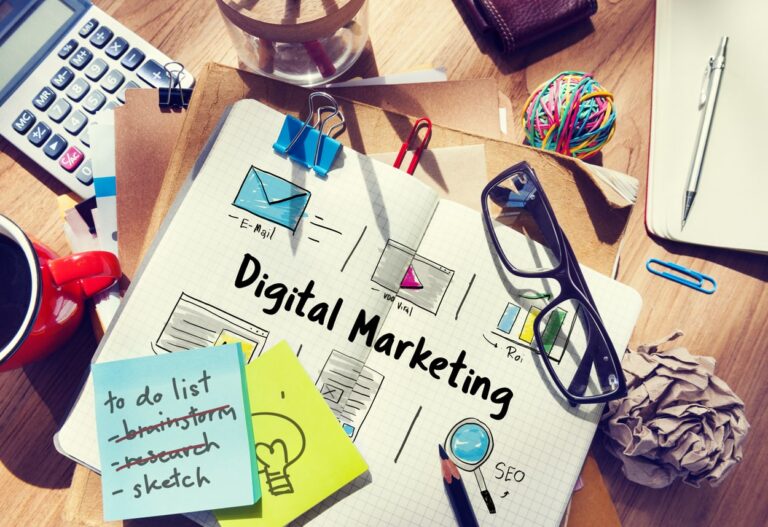Business owners must understand the importance of digital marketing to stand out and reach their target customers. Digital marketing, sometimes referred to as online or internet marketing, is the practice of using online methods of promoting and selling products or services. As technology continues to expand, so does the number of potential customers and their access to Internet-based businesses.
Digital marketing gives businesses an opportunity to promote themselves without relying on expensive print and television advertisements. By tapping into customer segments found through social media, search engine optimization (SEO), content creation, email campaigns, influencer marketing, and more, digital marketers are able to tailor messaging for better visibility across channels that match core objectives. Digital marketing can also give even small businesses access to a global market by providing in-depth knowledge about customer behavior that only large businesses could previously afford in the pre-digital era.
Digital technology gives today’s business owners a competitive advantage that traditional advertising models cannot provide. Businesses have begun utilizing professional digital marketing services to gain visibility and reach a larger audience than ever before. Digital marketers can analyze performance data in real time—an ability traditional marketers could only dream about before now—and optimize campaigns for improved results with greater agility than was available in past years.
Digital technology makes it possible for business owners who don’t have large budgets or big teams of professionals working on their behalf to make an impact from minimal investments with maximum returns. Smart use of emerging digital tools can attract new customers while strengthening relationships with existing ones – driving revenue growth across revenue generations simultaneously leading them towards success opportunities they may not have otherwise experienced with traditional techniques like door-to-door sales calling and billboards.
What is Digital Marketing?
Digital marketing is a broad term that encompasses a variety of online strategies aimed at achieving specific business goals. It includes areas such as search engine optimization (SEO), pay-per-click marketing (PPC), content marketing, social media marketing, email marketing, and more. Digital marketing is an effective way to reach a target audience and capture leads, conversions, and sales.
Let’s take a look at some of the benefits of digital marketing and why it is important for business owners:
Types of Digital Marketing
Digital marketing is any form of marketing products or services that involves electronic devices. This kind of marketing utilizes different internet-based digital technologies such as desktop computers, mobile phones and other digital media and platforms to promote products and services. It allows businesses to target a wider audience with lower costs and greater efficacy, unlike traditional forms of marketing.
Types of Digital Marketing:
- Search Engine Optimization (SEO): This type of digital marketing is focused on optimizing the visibility of a website on search engines such as Google, Yahoo, Bing, etc. It is done by incorporating keywords into content, content meta tagging/descriptions, building external links and properly managing a website’s architecture so that it appears nearer the top results in search engine query pages (SERPs).
- Pay Per Click Advertising (PPC): Popularly referred to as SEM (Search Engine Marketing), PPC advertising involves businesses bidding on keywords so their websites appear higher in the SERPs when consumers search for those terms related to their business offerings or offerings from competitors.
- Social Media Marketing: This form involves creating content in order to gain followers, drive traffic and generate leads for the business’s offerings across various social media platforms such as Facebook, Instagram, Twitter, LinkedIn etc.
- Content Marketing: This type of digital marketing becomes successful when appropriate targeted content is created which people engage with online via blogs/vlogs/podcasts/webinars etc.. Content drives organic search traffic which can further drive other organic traffic sources (word-of-mouth).
- Influencer Marketing: This type utilizes influencers across various social media platforms who create attention towards products or services through engaging content often portraying sponsored product placements on posts they create; influencers have proven to be powerful driving forces in the world of online customer acquisition campaigns due to their built-in fan bases having direct familiarity with the brand in question being promoted through them – almost like a trusted recommendation among friends!
- Mobile Advertising & Targeted Ads: Mobile advertising allows marketers to target audiences based on smartphones/tables/desktop audiences depending on individual customer interests at various locations representing varying stages within their buying journeys. It also allows for better personalization since data can be tracked about customer intent enabling contextualized messages tailored specifically for each individual user profile according to what type offer would likely entice them best at any given moment or time period during their purchase cycle.
Benefits of Digital Marketing
One of the key benefits of digital marketing is its ability to allow businesses to reach an expansive target audience. It gives companies access to customers on a much larger scale than traditional marketing channels, such as radio and print. It allows marketers to quickly respond to customer feedback and optimize campaigns accordingly.
Digital marketing also allows for the customization of material displayed that is tailored to individual users. This can help businesses develop more effective relationships with their target audience, as well as allowing for personalization of messages across various platforms. Digital marketing has opened up new opportunities for marketers to reach customers in ways never before possible, helping them build relationships and trust through more direct forms of communication.
Not only does digital marketing help businesses reach more people, but it also helps them do so at a fraction of the cost associated with traditional advertising methods. Since digital media is delivered digitally, there are no printing or shipping costs involved – meaning digital campaigns can reach extremely wide audiences at lower costs per person reached than traditional campaigns in print media or television ads. Digital media also offers measurable results since each click or engagement can be tracked accurately and quickly compared to other channels or platforms used in a campaign’s overall strategy.
Another great advantage of digital marketing is that it enables businesses to track behavior and usage data better than traditional means ever could. With platforms such as Google Analytics, marketers are easily able compare different campaigns within different timespans and tweak strategies accordingly when necessary – all without having to spend additional money on resources such as printing or shipping. Finally, by offering an unparalleled level of personalization it allows businesses the opportunity for one-to-one communication with their customers that just can’t be matched by most offline media resources today; this further increasing the potential effectiveness of each campaign.
How to Implement Digital Marketing
Digital marketing can play an important part in your overall business strategy. Not only can it help you reach a larger audience, but it also has the potential to significantly boost your sales. However, in order to be successful in digital marketing, you need to have a clear strategy in place.
This blog will show you the best ways to implement digital marketing and make the most of this powerful tool:
Develop a Digital Marketing Strategy
Developing a digital marketing strategy is the first step in any successful online marketing campaign. A comprehensive digital marketing strategy should include the following elements:
- Audience Targeting: To create an effective digital marketing strategy, you need to identify and research your target audience. Define what demographic data such as ages, gender, location, etc. you’d like to capture. Use Google Analytics or other analytics tools as well as surveys and interviews to gain detailed insight into this target audience.
- Content Strategy: Content makes up a huge part of the modern digital experience and content governance is essential for effective digital marketing. Develop editorial guidelines that define how content is created, published, promoted and managed consistently across teams and departments. Also make sure that you’re regularly evaluating metrics to ensure that your content marketing efforts are performing well against your objectives.
- Email Marketing & Design Strategy: Utilizing an email marketing platform such as MailChimp allows for easy integration of content with best practices for crafting emails to convert leads into customers or advocates of your brand. Pay close attention to how emails appear in different web clients since email design options vary widely from client-to-client. Additionally consider campaigns to generate awareness or promote services/products aimed at your target audience (Develop B2B/B2C Relationships).
- Promotion & Advertising: Leverage organic search engine optimization (SEO) tactics by developing high quality keyword-dense content including blogs and social media postings or purchase radio advertising or search engine sponsored ads through networks like AdWords/Bing Ads (Social Media Management). You can also consider incentivized advertising strategies such as giving customers discounts in exchange for sharing their information with your site (Referral Program). This can help build an enthusiastic customer base eager to spread word about any promotions offered throughout the year!
- Social Media Optimization & Management Strategy: Any successful digital marketing strategy should factor in social media activities with platforms like Facebook, Twitter, Instagram etc.. Integration across all channels should be seamless with consistent branding throughout experiences so users don’t get confused by different designs within each platform (Uniform Branding). Develop a multiplatform presence that fits within budget boundaries but always maximize all possibilities by aiming at keyword rich titles for blog posts/social media updates whenever possible (SEO Optimization).
Identify Your Target Audience
To create a successful digital marketing campaign, start by identifying your target audience. This can be done by creating simple buyer personas to represent you ideal prospects and understanding their interests, needs, behaviors and the channels they are most likely to use. It’s also important to research the current industry trends and how different audiences respond to messages in different channels.
Once you have identified your target audience and industry trends, create an actionable plan that bridges the gap between you want to achieve and what your targeted prospects want. Set smart goals based on your research and define KPIs that quantitatively measure performance – such as website visits, lead conversions or online sales revenue.
Digital marketing strategies come in many forms including social media posts, emails, blog posts, search engine optimization (SEO) tactics, content creation for websites or podcasts, pay-per-click advertisements (PPC), webinars or video tutorials. These activities should have distinct purposes and should be tailored to fit the preferences of the desired demographic groups that you have identified as potential customers. It is also important to consider optimizing these campaigns for mobile devices in order to reach as wide an audience as possible.
Once your campaign has been created – use analytics tools such as Google Analytics or UTM tracking software – to monitor the success of each tactic at engaging with consumers and meeting KPI objectives. If a particular tactic is underperforming or failing to lead towards desired outcomes – reallocate budget or focus efforts in another direction until satisfactory results are reached using data from analytics tools such as market segmentation reports provided by providers like Facebook Ads Manager of Google Adwords search engine.
Create Engaging Content
Creating and delivering rich, inspiring content on your organization’s digital assets is a vital part of any successful digital marketing campaign. Your content should be informative, helping visitors learn from and find value in what you have to share. It should also be engaging, clicking with readers to further explore the topics you are featuring. All of this helps ensure that your content will inspire conversions like email subscriptions, downloads or even sales.
When creating content for digital marketing campaigns, consider leveraging different kinds of materials; images, videos or written blog posts can all help increase engagement among target audiences. Additionally, practices like A/B testing to measure the effectiveness of different calls-to-action or headlines can optimize performance while making sure new features deliver the desired results. It’s important to remember that different pieces of content have different useful lives so it is a good idea to mix up your approach often – staying fresh and relevant will keep people coming back for more!
Utilize Social Media Platforms
One of the most effective ways to implement digital marketing is through social media. There are a variety of platforms available today, each one offering different capabilities for a business’s maximum outreach. The key is to find the best way to leverage digital platforms to reach potential customers and build relationships with them.
When it comes to social media, it’s essential to post regularly, use visuals that resonate with your target audience, and always respond to comments in a timely manner. Additionally, you should create content that provides valuable information while simultaneously showcasing your brand’s services or products.
In order to maximize the effectiveness of your social media campaign, you can increase reach by engaging influencers in your space or running targeted ads that use strategies such as demographic targeting, interests targeting and placement targeting. For example, if you own an e-commerce store selling pet supplies, you could target ads on Facebook towards pet owners and use interests targeting for keywords like “dog grooming supplies” or “cat food”. You can also use optimization tools such as Google Ads to refine and optimize your campaigns by setting budgets and scheduling posts for specific times.
To optimize engagement with existing customers, you can use insights from analytics tools such as Google Analytics or Facebook Insights that provide demographic data about who is viewing or following specific posts or pages on your website. This allows you to identify patterns from which new strategies can be formed in order maximize reach efforts towards desired customer groups connected with products or services related specifically to them.
Leverage Email Marketing
Email marketing provides businesses with one of the most cost-effective ways to reach a large customer base and helps to drive sales and grow businesses. When implementing digital marketing, email should be an essential part of any comprehensive plan. With email campaigns and newsletters, businesses can not only keep their current customers up to date on new products and services but also introducing their services to new markets in order to increase sales.
When crafting emails it is important to include a clear call-to-action, that encourages readers to take the desired action (buy product, visit website, register for event). It’s also important that emails are optimized for mobile devices so that they are accessible on any sized screen or device type. In addition, emails should be crafted with personalization in mind. This can be done by using segmentation tools that allow you to target the right customers with relevant messages at the right time. Finally, there needs to be some method of tracking performance so that you can see what approaches produce results and achieve a good return on investment (ROI).
By leveraging email marketing as part of an overall digital marketing plan, businesses can enjoy increased customer engagement which leads to more sales and revenue growth over time. Email campaigns need not become too difficult as long as it is planned strategically from the start.
Conclusion
In conclusion, digital marketing is essential for any business owner who wants to build a successful and profitable business. Digital marketing can help businesses reach more potential customers, understand their target audience better and improve the customer experience. Digital marketing also helps businesses measure their ROI, track results, and understand what strategies are working. Ultimately, digital marketing can help businesses reach their target audiences and achieve their goals at a lower cost than traditional advertising.
If your business is ready to take advantage of the benefits that digital marketing offers, it’s important to find the right digital agency that can provide you with all the services you need so you can succeed in today’s digital world.





